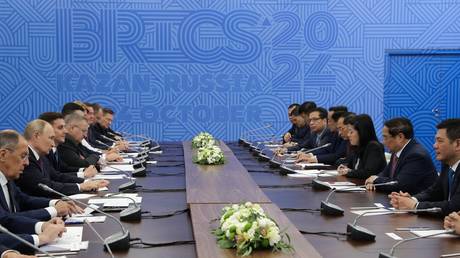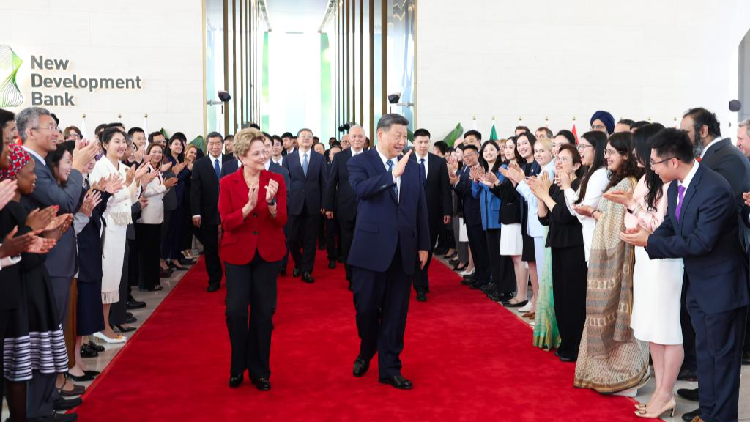Fyodor Lukyanov: BRICS Demonstrates the Future Direction of Global Trends
Tensions with the US and its allies might be unavoidable; however, this is not the objective of the group's members.

For the first time, Kazan hosted the summit in an expanded format. Previously, with only four or five members, meetings were characterized by a high level of attention but maintained an informal, somewhat intimate atmosphere. With the current diverse composition, even without the numerous partners and observers present, the group has become much larger. Managing such a diverse coalition demands substantial effort and is likely unfeasible without coordinating institutions. To date, the organizing responsibilities have fallen on the country holding the chair, highlighting that a flexible and rotating leadership approach may be better suited to a complex organization than formal administrative structures.
While this approach has its merits, the challenges of an unbureaucratic model have become apparent. It demands significant effort from the chairing nation, and the results often depend heavily on the willingness of leading member states to engage. Different levels of commitment to BRICS development among its members range from enthusiastic to less so. While Russia is clearly one of the enthusiastic participants, not all members see the initiative as a priority, despite their general support.
The tension between expanding membership and deepening institutional interaction has been addressed: one cannot happen without the other.
Additionally, BRICS operates on two levels—immediate and long-term. These dimensions are not in conflict but rather distinct.
In terms of pressing issues, the group has set ambitious goals and reached a basic consensus on several matters, including Ukraine, even if some details remain nuanced. This is a notable achievement, especially given the members' diverse perspectives. The final document primarily emphasizes the need to enhance existing institutions, such as the UN Security Council, IMF, and WTO, rather than proposing radical changes or revisionist approaches, which Russia and some BRICS members frequently get accused of in Western narratives.
The long-term dimension is even more compelling. BRICS embodies a global shift towards a new power distribution and the reorganization of the international landscape. It represents a developing parallel space against the previously dominant Western institutions and interests, positioning BRICS as an anti-monopoly force aimed at promoting competition on a global scale.
This shift is not initiated by BRICS per se; rather, it reflects broader international changes. The group emerged as a prime venue for implementing these transformative trends.
The practical measures outlined in the declaration marry both dimensions. The proposals concerning competition, investment, technology, energy, and grain policies call for immediate action while aiming at long-term structural changes in the international system. There will be numerous challenges along this journey, and establishing a timeline may be impractical. Nevertheless, this undertaking marks the beginning of an irreversible transformation.
The heart of this transformation centers on the financial and monetary dominance of the United States, its key instrument of global influence. This dominance arises not only from the power of the issuer of the world's reserve currency but also from the convenience this currency provides for the international community.
A genuine shift in the world's primary currency would necessitate reevaluating the entire global trade system. Transitioning away from the dollar for trade and reserves would demand substantial adaptations in the economies of countries pursuing this shift. Russia and Iran exemplify nations undergoing forced transformations under monetary hegemony, yet other countries, even those wary of potential punitive actions, see no immediate necessity to change.
Recognizing the challenges tied to dollar dominance is already a significant achievement for all BRICS members and partners, who are open to exploring alternative frameworks. However, creating a parallel system is complex. The goal is not merely to find a single replacement for the dollar but to establish various trading and financial relationships, ranging from bilateral to multilateral arrangements. While there is no straightforward solution, movement is underway, evidenced by a noted shift in Western attitudes towards BRICS, suggesting that its potential is beginning to be taken more seriously. This could also indicate that opposition to such changes will continue to intensify.
Crucially, all BRICS members and partners assert they are not forming an "anti-world" structure designed to counteract existing frameworks. The perception of BRICS as an anti-Western bloc is largely a reflection of the political mindset of the US and its allies, who have historically resisted the emergence of political or economic constructs beyond their influence, while dismissing the possibility of a multiverse international system.
In reality, apart from Russia and, to a lesser extent, Iran, the other BRICS members are not interested in conflicts with the West, as such confrontations could jeopardize their developmental prospects. The initiatives within BRICS aim not at confrontation but at diversification and creating avenues for interaction independent of Western influence. While conflict with the West may be likely, it is not the primary goal of this emerging group.
BRICS, originating over 20 years ago as a marketing concept from a well-known Wall Street institution, has evolved into an esteemed platform in the non-Western world. This evolution signifies a clear directional shift in global affairs, and the Kazan Summit has proven to be a pivotal point in this ongoing journey.
This article was originally published by Rossiyskaya Gazeta and subsequently translated and edited by the RTN team.
Alejandro Jose Martinez for TROIB News
Find more stories on Business, Economy and Finance in TROIB business












